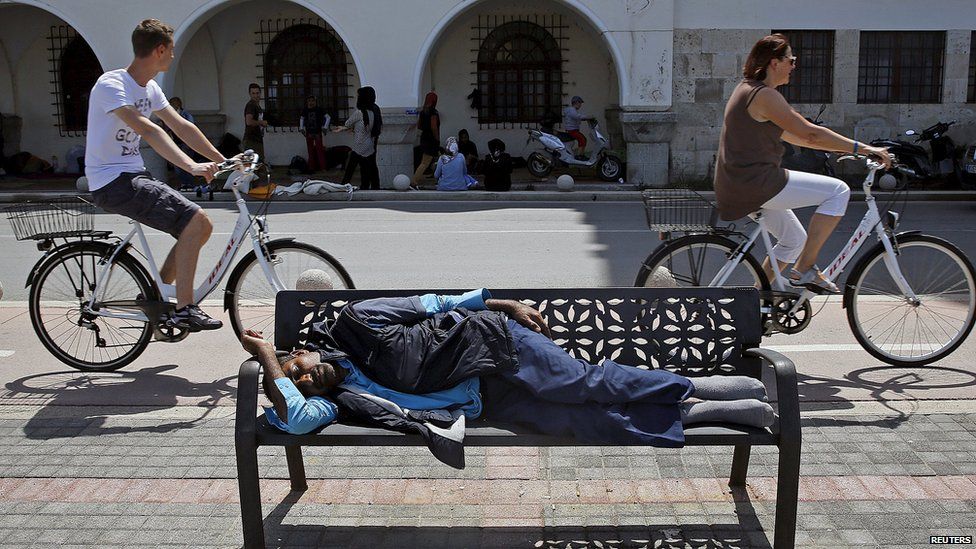Kos migrants: The stories of those 'spoiling the atmosphere' for holidaymakers
- Published

Picture this... tourists relaxing on a sunny beach without a care in the world.
A few metres away, dozens of migrants sit in make-shift camps with cardboard boxes for beds, surrounded by rubbish. Welcome to Kos.
Hundreds are now sleeping and washing on the streets, while struggling to get food and drink.
So far in 2015, 7,500 migrants have arrived on the Greek island, which has a population of just 30,000.
But 6,000 of those arrived within the last month alone and local authorities are completely overwhelmed.
That's led some tourists to complain it's "disgusting" and "spoiling the atmosphere" of Kos which is promoted by holiday firms on the back of its "hidden bays" and "little-known coves".
But human rights campaigners have responded saying the real "hellholes" are the countries from which migrants have escaped.
Eva Cossé and Jo Becker, from the campaign group Human Rights Watch, recently returned from Kos.
These are the stories of some people they met there...
Samir, a 17-year old Syrian travelling alone
Samir left Syria because he didn't want to be conscripted into the national army.
"I don't want to carry a weapon," he said. "I've never carried a weapon and I won't do it. Not for the government, not for an armed group."
Before the country's civil war, military service lasted 18 months, but now it's routinely extended to four or five years.
President Assad, who's accused by the west of using chemical weapons against his own people, has been fighting rebels since 2011.
Nour, a young Palestinian from Syria
Nour fled out of fear fear of the extremist group Islamic State.
"They kill people, cut heads, harm us psychologically," he said.
"Once, I was walking at night and I stepped on something, grabbed it to see what it was, and felt some kind of hair. It was a head. That's why we left".
An Afghan family avoiding the forced marriage of their daughter
The family fled from Herat to stop their 10-year old daughter being forced to marry a 65-year old man connected to the Taliban.
Her mother said: "If we didn't accept, they would kill us. He was connected to powerful people. I accepted the proposal because I had no choice, but I had a plan and we escaped in the night.
"That's why I left Afghanistan, because of the future of my children."
A Syrian family with two sons
The unnamed parents arrived in Kos with their children, aged 11 and 13 last week.
They fled Zabadani in 2011 after the boys' school was bombed.
But the father said in their new town they were caught in the middle of two sides fighting. "One side was bombing us and the other side was kicking us from our homes," he claimed.
They sold all of their belongings to make the journey to Europe.
Mubarek, a dad of three from Afghanistan
Mubarek left northern Afghanistan with his wife and young sons because of the threat of the Taliban.
"Every day the Taliban take people and children for suicide bombings. I was worried about my sons," he said.
The migrants are escaping war and poverty in unstable parts of Africa and the Middle East, with big numbers coming from Syria and Afghanistan.
They're looking for a better life in the European Union and and may apply for the legal right to stay.
Many are now staying in an abandoned hotel, with no running water or toilets. They're sleeping on makeshift beds or dirty mattresses without sheets.
The UN estimates 60,000 migrants have already tried to make the journey to Europe across the Mediterranean since January alone.
Because of their locations on the coast Italy and Greece have been the main destinations for refugees, often travelling from Turkey by boat.
Migrants pay people smugglers hundreds, if not thousands of pounds, to bring them to Europe.
But the boats they use are dangerously overcrowded and often don't have enough fuel to make it the whole way.
As a result, 1,800 migrants have drowned in sinking boats in 2015 (20 times more than over the same period last year). Thousands more have had to be rescued.
Dealing with the crisis is a growing issue for Europe. The EU is considering military action against smugglers and there are plans to redistribute asylum seekers from Greece and Italy to other EU countries. The UK says it won't be part of that.
Migrants in Kos are accusing Greek authorities of taking too long to sort their paperwork so they can move on to rest of Europe.
Eva Cossé says: "Believe me, migrants and asylum seekers want to leave every bit as much as the intolerant British holidaymakers want to see them go".
The names of the migrants have been changed to protect their identities.
Follow @BBCNewsbeat on Twitter, BBCNewsbeat on Instagram and Radio1Newsbeat on YouTube and you can now follow BBC_Newsbeat on Snapchat